thank you for dinner
Prunella Clough
Deborah Lerner
February 26 - April 5
2025
Prunella Clough
Deborah Lerner
February 26 - April 5
2025

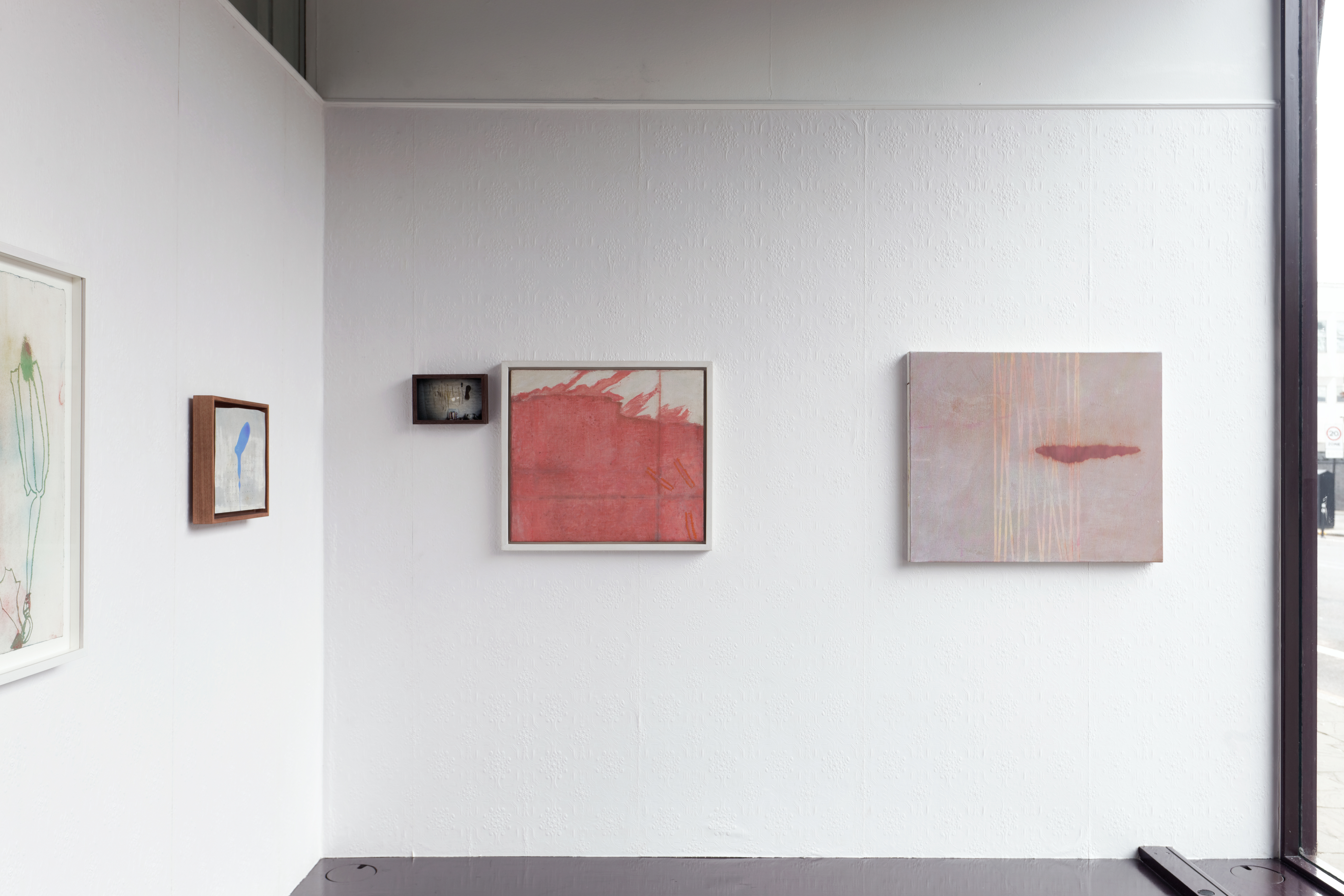
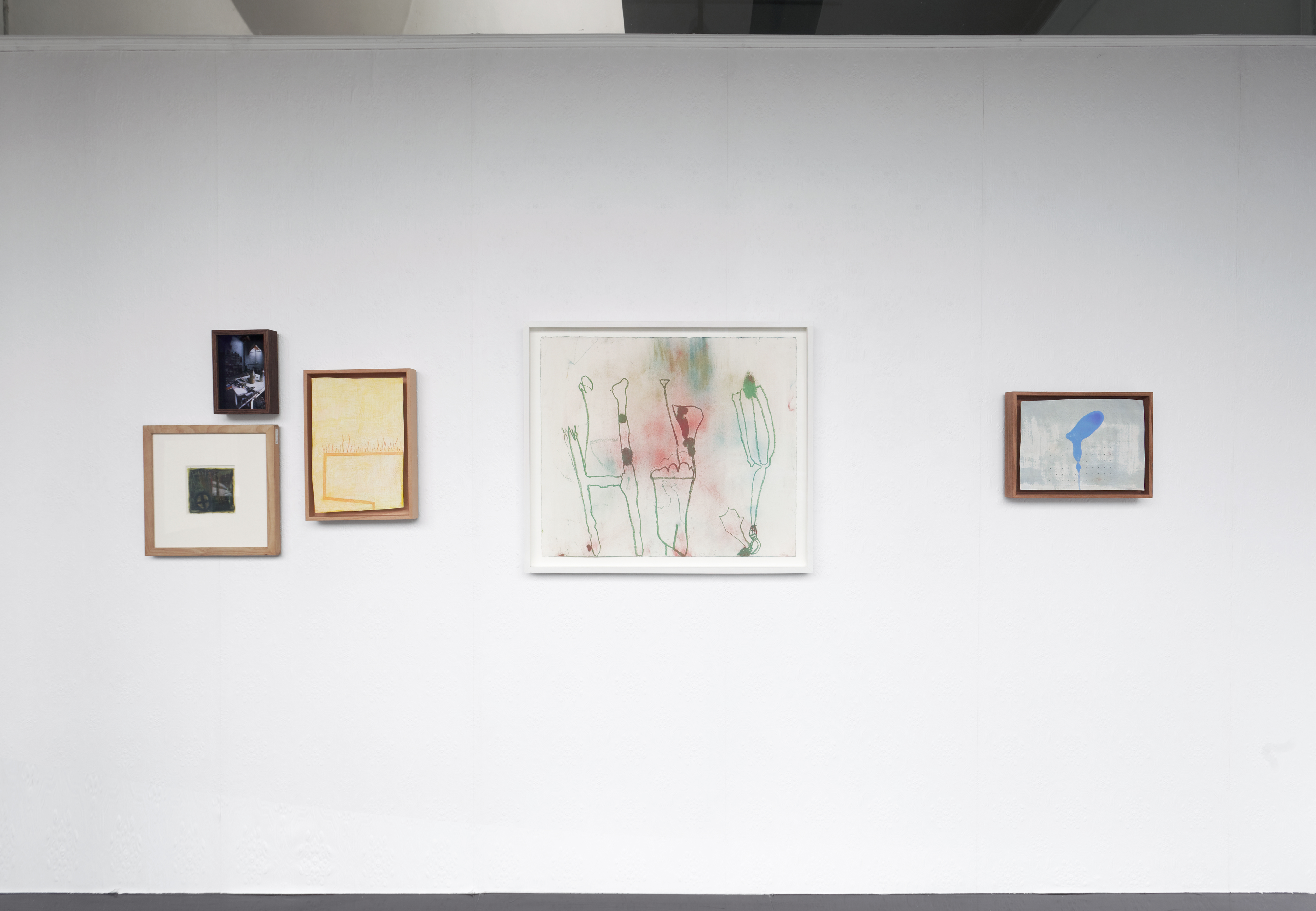
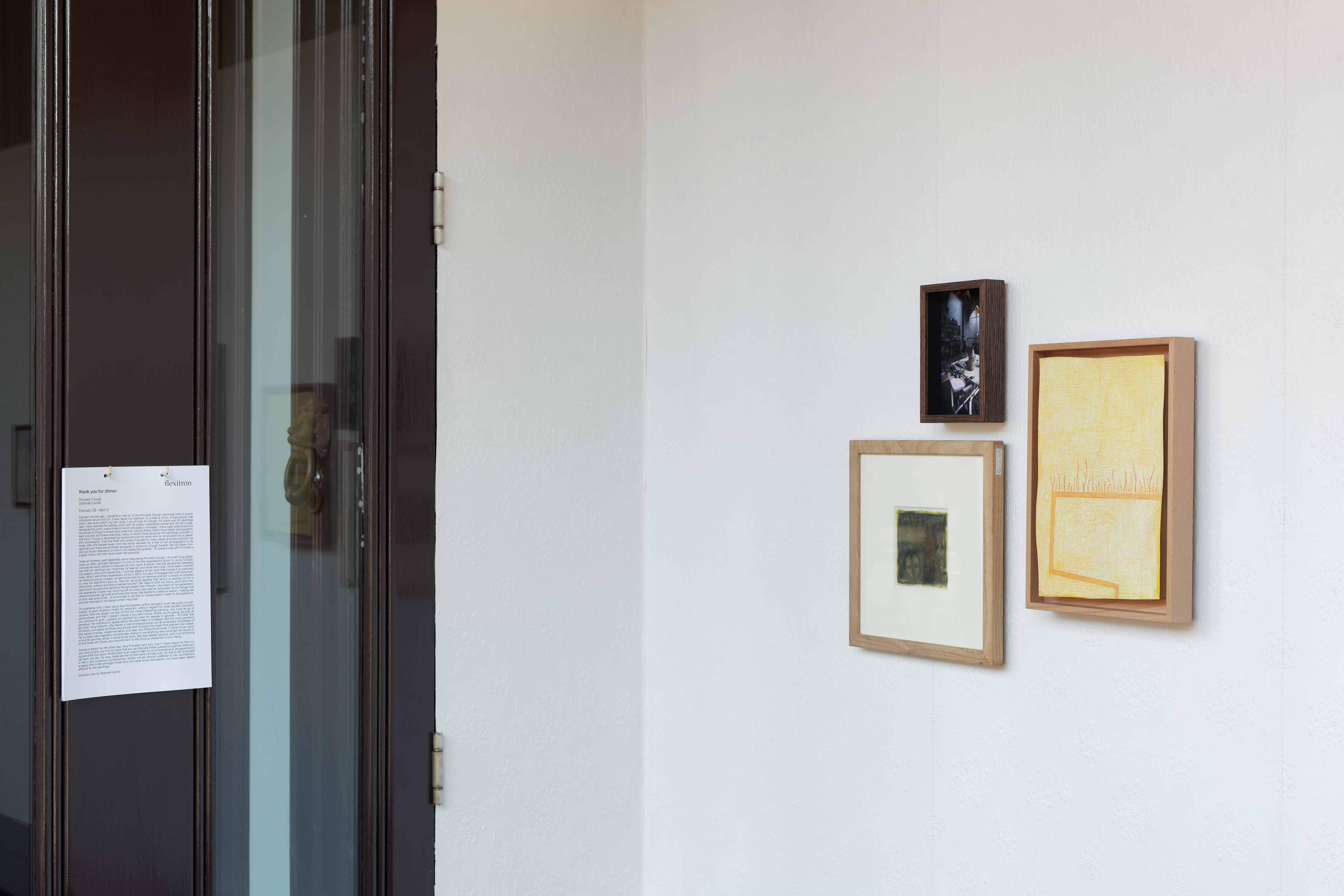
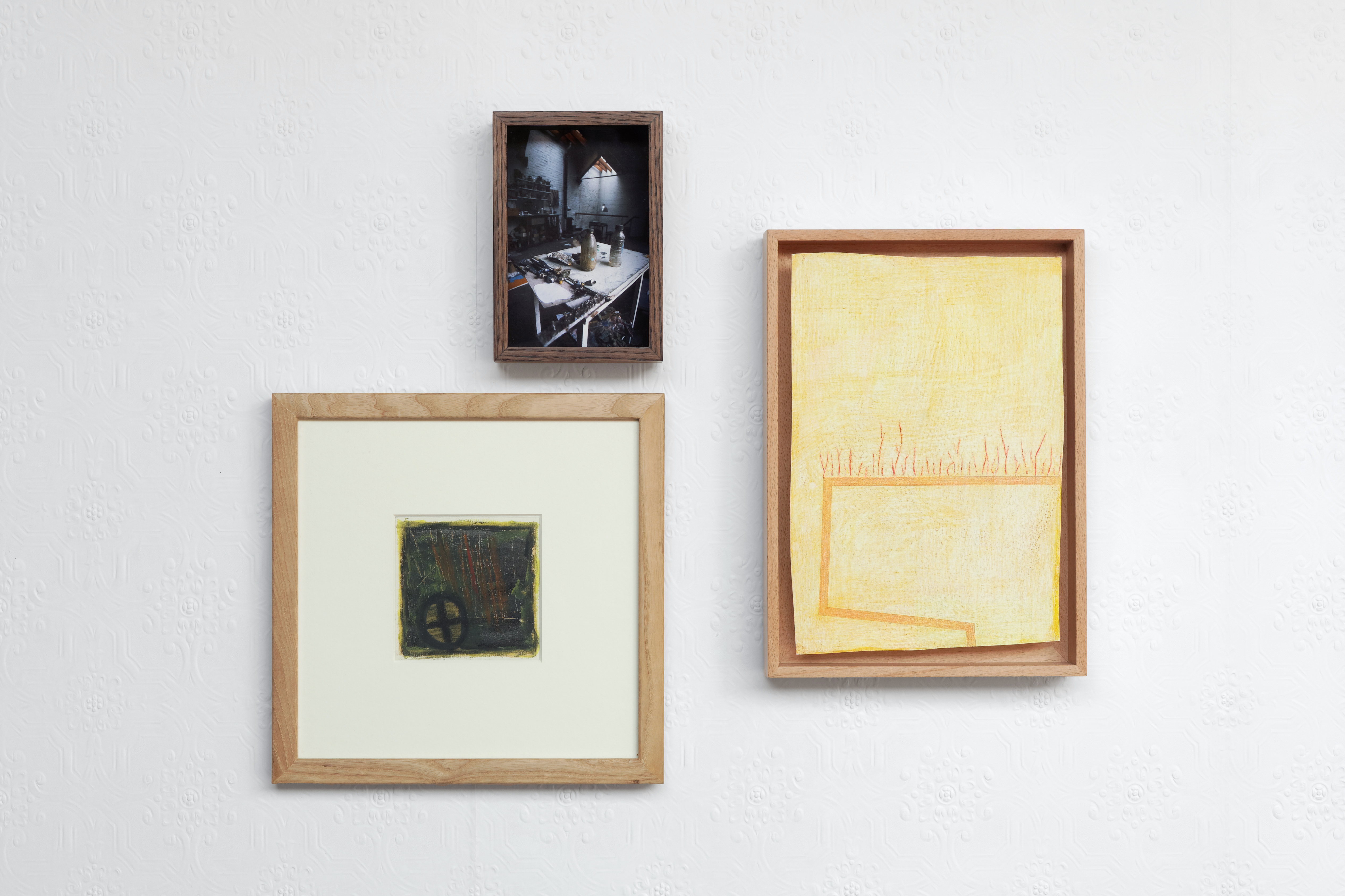

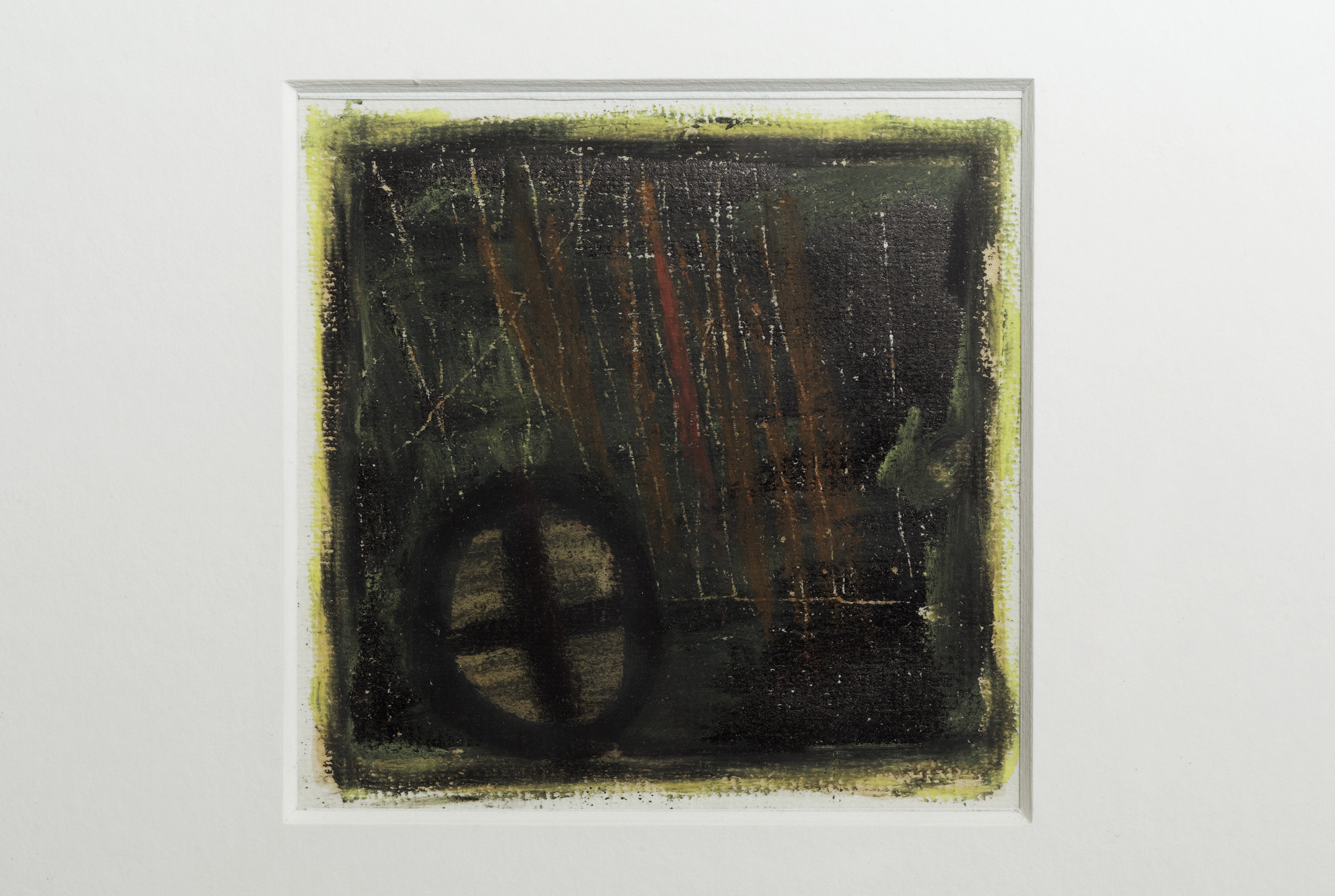
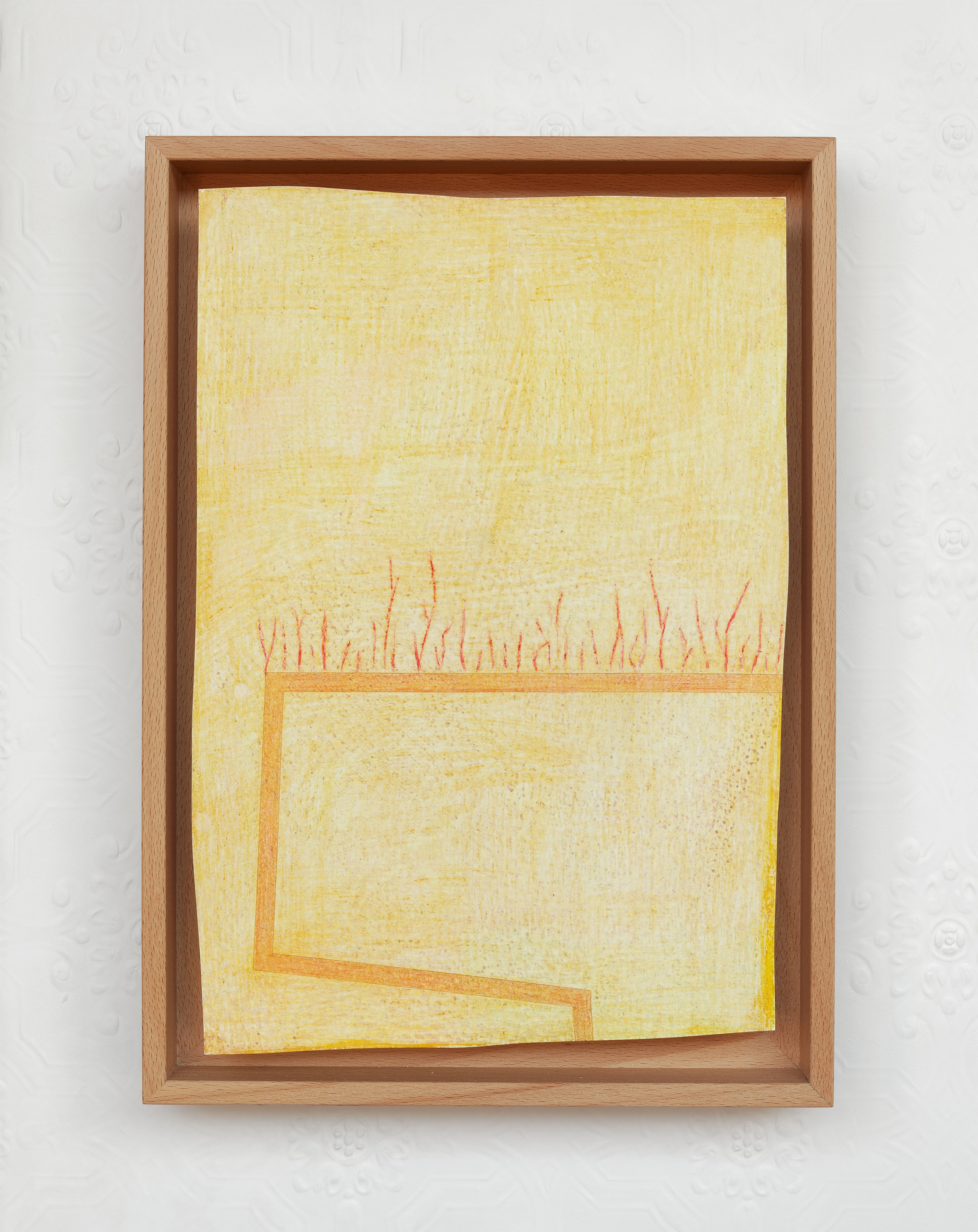




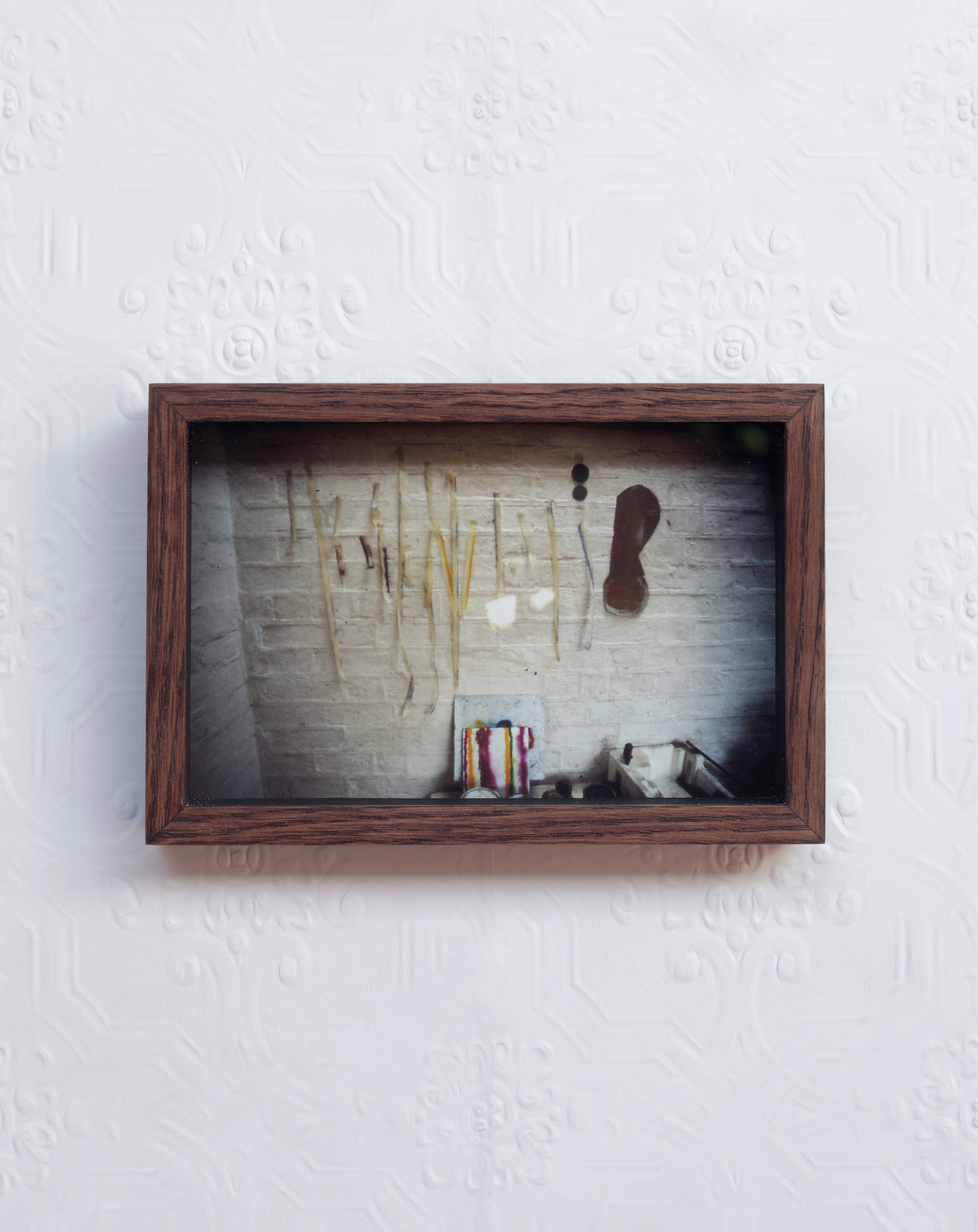



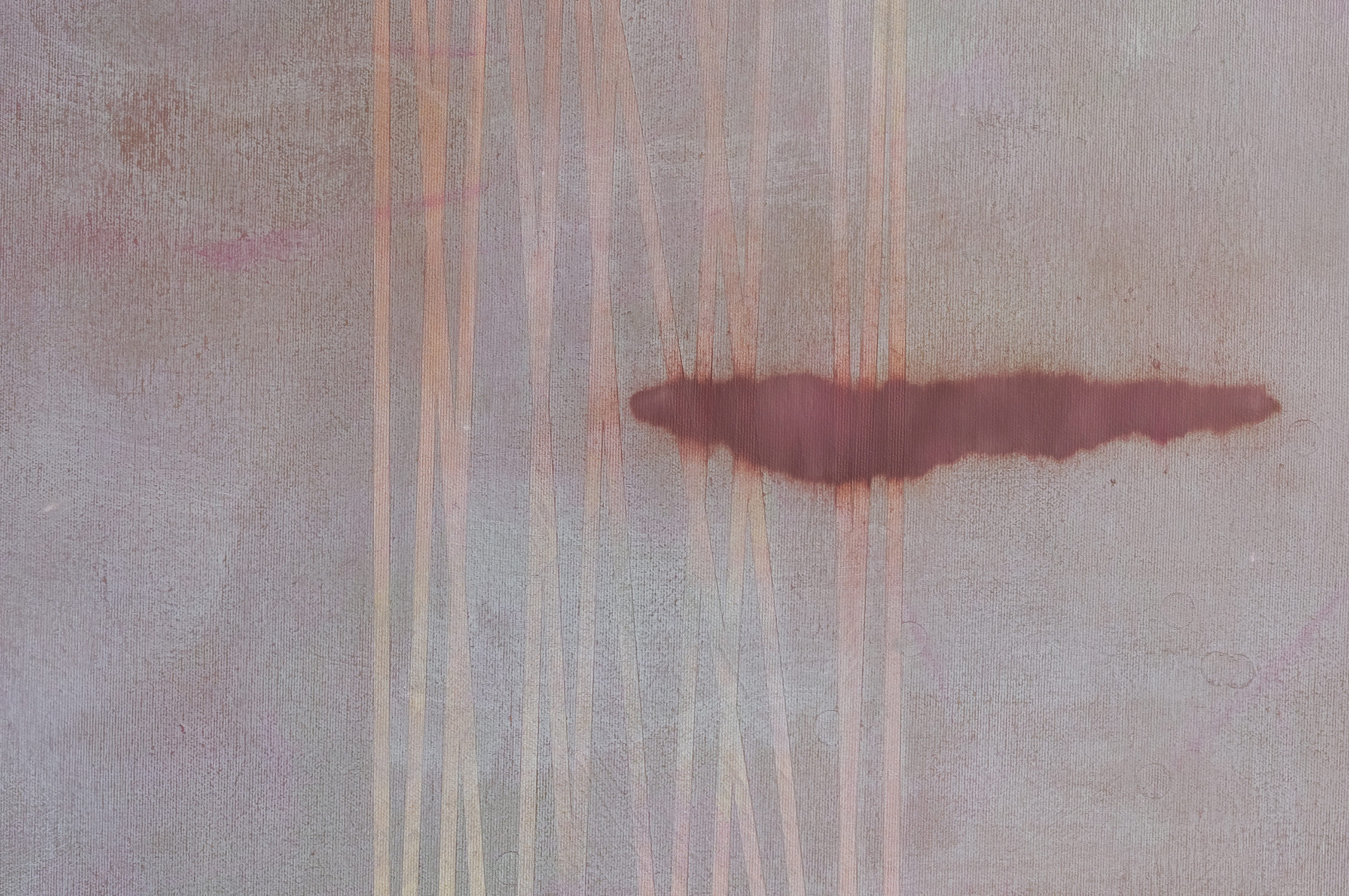

Eighteen months ago, I decided to visit all of the Prunella Clough paintings held in public collections around the UK. It was never my intention to curate a show, it was simply that when I was stuck within my own work, I would look to Clough. 45 trains and 80 paintings later, I have reached the halfway point with 33 public collections visited and 34 left to see. Alongside the public works (most of which are sadly in storage), I have been welcomed into the homes of Clough’s friends and collectors. During these visits I have taken photographs, kept a journal and made drawings; many of which have become the paintings included in this show. Through a serendipitous encounter (via my sister who is not an artist but a paediatric cardiologist), I met Sue Snell who knew Prunella for many years and documented her studio after she passed away. She has kindly allowed for a few of her photographs to be reprinted and these are exhibited alongside 3 works by Clough herself, lent by Hales London and Austin Desmond, to whom I am especially grateful. To share a wall with Prunella is a great honour and they have made that possible.
There are phrases used repeatedly when discussing Prunella Clough. ‘A small thing edgily’ crops up often, perhaps because it is one of the few expressions given to us by Clough, who was famously reticent to discuss her own work. Another, that she apparently detested, was that her paintings are ‘machines for seeing’ and while she might have been mortified that people continue to repeat this, it is a key aspect of her work that makes it so pertinent today. What I and others experience, living in 2025, is a lack of engagement with the physical world around us; instead, we are consumed by our devices and our curiosity is curtailed by what the algorithms give us. How do we push against that which is leading us into a more lonely, anxious and disconnected society? We need to shift our focus, and I don’t believe there’s anyone who reorients the eye better than Clough. Like many of her generation, the experience of post-war rationing left its mark; she was an advocate for the things that others overlooked, ignored and threw into skips. Her desire to create no waste - making use of what was around her - is a reminder to all that to create doesn’t need to be expensive, and that newness is not always what’s required.
On a personal note, I have found that the freedom within Clough’s work has given me permission to paint whatever holds my attention, without regard for what society considers valuable. She has taught me that to find the most interesting painting, you must let go of preciousness, and that it doesn’t matter if you don’t know where you’re going, as long as you continue to graft. Lessons for painters but also for people in general - Prunella was generous. Her reticence to speak about the work feels in hindsight like the most generous act of all: never didactic, she leaves a trail of breadcrumbs via her extensive knowledge of art history, and space for those who simply wish to enjoy the magic that pigment can create. She valued process, experimentation and was non-hierarchical when it came to her tools; her curiosity was insatiable, and she was willing to use anything she could get her hands on to find the painting. When it came to her work, she was deadly serious, and it is comforting to find those who share your commitment to the thing so essential to your being.
Someone asked me the other day: why Prunella? and why now? I have begun to form my own conclusions, but it is my hope that we can discuss these questions together, both during and after this show. Whilst there is an urgent need for a comprehensive retrospective of her work, we can, for now, celebrate her in this more intimate way. All that is left to be said is that I, and numerous contemporary artists will be forever indebted to her contribution, a legacy that is felt amongst those who will never know the painter; but have been deeply affected by the paintings.
Exhibition text by Deborah Lerner
![]()
1. Prunella Cloughs studio c. 2000, photograph by Sue Snell ©
2. Prunella Clough, Untitled (Dark Green), c.1986, gouache on paper, 10 x 10.2cm (unframed), from the collection of Austin Desmond Fine Art
3. Deborah Lerner, By the Canal, 2023, acrylic and coloured pencil on 300gsm paper, 31 x 22cm (framed)
4. Prunella Clough, Composition, 1992, pastel on paper, 45.5 x 63cm, from the collection of Hales London
5. Deborah Lerner, Climbing Fences, 2024, acrylic on 300gsm paper, 22 x 29cm (framed)
6. Prunella Cloughs studio c. 2000, photograph by Sue Snell ©
7. Prunella Clough, Pink Edge, 1973, oil on canvas, 41 x 45cm, from the collection of Austin Desmond Fine Art
8. Deborah Lerner, Pylons, 2024, acrylic and oil on linen, 50 x 60cm
Biographies:
Prunella Clough
Prunella Clough (1919 – 1999) was born in London and studied at Chelsea School of Art. During her lifetime she had numerous solo exhibitions including those at Whitechapel Gallery, London (1960), Graves Art Centre, Sheffield (1972), National Gallery of Modern Art, Edinburgh (1976), Fitzwilliam Museum, Cambridge (1982) and Camden Arts Centre, London (1996). Recent group exhibitions include Contour Lines curated by Tom Cole at Sid Motion Gallery, London, UK (2025), The Street curated by Peter Doig at Gagosian, New York, USA (2024) and Machines for Seeing With, Brunette Coleman, London, UK (2023). Upcoming exhibitions include Place Revisited, Stuart Shave Modern Art, London, UK (2025).
Deborah Lerner
Deborah Lerner (b.1989) was born in Kings Lynn, she graduated from Camberwell College of Art in 2023. In 2024 she participated in the inaugural Apollo Painting School and was included in the book ARTISTS by Brynley Odu Davies, published in 2023. Recent exhibitions include Apollo Painting School 2024, Alice Amati, London, UK (2025), Small is Beautiful, Flowers, London, UK (2024), In Residence in Transit, Museo Cambellotti, Latina, IT (2024), Drawing Biennial, Drawing Room, London, UK (2024) and Essential Structures, Gerald Moore Gallery, London, UK (2024).
Acknowledgements:
I would like to thank the following collections that have accommodated my requests to view works; Victoria and Albert Museum, Tate, The British Council, Government Art Collection, The British Museum, The Courtauld, London Borough of Camden, Reading Museum, Lady Margaret Hall (University of Oxford), JCR Art Collection at Pembroke College (University of Oxford), Ashmolean Museum, Gwen Hughes, Southwark Council, Pallant House Gallery, Portsmouth City Museum, Annely Juda, Jerwood Collection, Leicester City Museum, Sacha Craddock, Kettles Yard, Clare College (University of Cambridge), The Fitzwilliam Museum, Norwich Castle and Gallery Museum, Whitworth Art Gallery, Manchester City Art Gallery, Charles Asprey, Walker Art Gallery, Bonhams, Dan Thornton, Birmingham City Art Gallery, Hales Gallery London and Flowers Gallery London.
Additional gratitude must be extended to Charles Asprey for his generous contribution towards my travel expenses, Matt Flowers for his general zeal in regards to this project, Leon Scott-Engel for the invitation to be part of the Flexitron programme, Jenny Clarke for giving me the confidence to write this text (and then editing it to sounds better than I could have hoped) and last but not least, Mum, Dad and Dr Noo who have been there from the start when I had no idea what I was doing but supported me anyway.
There are phrases used repeatedly when discussing Prunella Clough. ‘A small thing edgily’ crops up often, perhaps because it is one of the few expressions given to us by Clough, who was famously reticent to discuss her own work. Another, that she apparently detested, was that her paintings are ‘machines for seeing’ and while she might have been mortified that people continue to repeat this, it is a key aspect of her work that makes it so pertinent today. What I and others experience, living in 2025, is a lack of engagement with the physical world around us; instead, we are consumed by our devices and our curiosity is curtailed by what the algorithms give us. How do we push against that which is leading us into a more lonely, anxious and disconnected society? We need to shift our focus, and I don’t believe there’s anyone who reorients the eye better than Clough. Like many of her generation, the experience of post-war rationing left its mark; she was an advocate for the things that others overlooked, ignored and threw into skips. Her desire to create no waste - making use of what was around her - is a reminder to all that to create doesn’t need to be expensive, and that newness is not always what’s required.
On a personal note, I have found that the freedom within Clough’s work has given me permission to paint whatever holds my attention, without regard for what society considers valuable. She has taught me that to find the most interesting painting, you must let go of preciousness, and that it doesn’t matter if you don’t know where you’re going, as long as you continue to graft. Lessons for painters but also for people in general - Prunella was generous. Her reticence to speak about the work feels in hindsight like the most generous act of all: never didactic, she leaves a trail of breadcrumbs via her extensive knowledge of art history, and space for those who simply wish to enjoy the magic that pigment can create. She valued process, experimentation and was non-hierarchical when it came to her tools; her curiosity was insatiable, and she was willing to use anything she could get her hands on to find the painting. When it came to her work, she was deadly serious, and it is comforting to find those who share your commitment to the thing so essential to your being.
Someone asked me the other day: why Prunella? and why now? I have begun to form my own conclusions, but it is my hope that we can discuss these questions together, both during and after this show. Whilst there is an urgent need for a comprehensive retrospective of her work, we can, for now, celebrate her in this more intimate way. All that is left to be said is that I, and numerous contemporary artists will be forever indebted to her contribution, a legacy that is felt amongst those who will never know the painter; but have been deeply affected by the paintings.
Exhibition text by Deborah Lerner

1. Prunella Cloughs studio c. 2000, photograph by Sue Snell ©
2. Prunella Clough, Untitled (Dark Green), c.1986, gouache on paper, 10 x 10.2cm (unframed), from the collection of Austin Desmond Fine Art
3. Deborah Lerner, By the Canal, 2023, acrylic and coloured pencil on 300gsm paper, 31 x 22cm (framed)
4. Prunella Clough, Composition, 1992, pastel on paper, 45.5 x 63cm, from the collection of Hales London
5. Deborah Lerner, Climbing Fences, 2024, acrylic on 300gsm paper, 22 x 29cm (framed)
6. Prunella Cloughs studio c. 2000, photograph by Sue Snell ©
7. Prunella Clough, Pink Edge, 1973, oil on canvas, 41 x 45cm, from the collection of Austin Desmond Fine Art
8. Deborah Lerner, Pylons, 2024, acrylic and oil on linen, 50 x 60cm
Biographies:
Prunella Clough
Prunella Clough (1919 – 1999) was born in London and studied at Chelsea School of Art. During her lifetime she had numerous solo exhibitions including those at Whitechapel Gallery, London (1960), Graves Art Centre, Sheffield (1972), National Gallery of Modern Art, Edinburgh (1976), Fitzwilliam Museum, Cambridge (1982) and Camden Arts Centre, London (1996). Recent group exhibitions include Contour Lines curated by Tom Cole at Sid Motion Gallery, London, UK (2025), The Street curated by Peter Doig at Gagosian, New York, USA (2024) and Machines for Seeing With, Brunette Coleman, London, UK (2023). Upcoming exhibitions include Place Revisited, Stuart Shave Modern Art, London, UK (2025).
Deborah Lerner
Deborah Lerner (b.1989) was born in Kings Lynn, she graduated from Camberwell College of Art in 2023. In 2024 she participated in the inaugural Apollo Painting School and was included in the book ARTISTS by Brynley Odu Davies, published in 2023. Recent exhibitions include Apollo Painting School 2024, Alice Amati, London, UK (2025), Small is Beautiful, Flowers, London, UK (2024), In Residence in Transit, Museo Cambellotti, Latina, IT (2024), Drawing Biennial, Drawing Room, London, UK (2024) and Essential Structures, Gerald Moore Gallery, London, UK (2024).
Acknowledgements:
I would like to thank the following collections that have accommodated my requests to view works; Victoria and Albert Museum, Tate, The British Council, Government Art Collection, The British Museum, The Courtauld, London Borough of Camden, Reading Museum, Lady Margaret Hall (University of Oxford), JCR Art Collection at Pembroke College (University of Oxford), Ashmolean Museum, Gwen Hughes, Southwark Council, Pallant House Gallery, Portsmouth City Museum, Annely Juda, Jerwood Collection, Leicester City Museum, Sacha Craddock, Kettles Yard, Clare College (University of Cambridge), The Fitzwilliam Museum, Norwich Castle and Gallery Museum, Whitworth Art Gallery, Manchester City Art Gallery, Charles Asprey, Walker Art Gallery, Bonhams, Dan Thornton, Birmingham City Art Gallery, Hales Gallery London and Flowers Gallery London.
Additional gratitude must be extended to Charles Asprey for his generous contribution towards my travel expenses, Matt Flowers for his general zeal in regards to this project, Leon Scott-Engel for the invitation to be part of the Flexitron programme, Jenny Clarke for giving me the confidence to write this text (and then editing it to sounds better than I could have hoped) and last but not least, Mum, Dad and Dr Noo who have been there from the start when I had no idea what I was doing but supported me anyway.